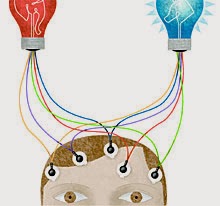There is a good reason that politics have
become a traditional taboo topic at the dinner table; one would be hard-pressed, after all, to find many subjects with the capacity to evoke equally impassioned arguments. Who among us has not left a politically-charged
conversation exasperated by the other person’s apparent failure to understand basic logic? Why do we feel that, when it comes to certain issues, we simply cannot
see eye-to-eye with those closest to us? Armed with ever-improving neuroscientific technology, researchers are beginning to investigate this puzzling question through the measurement of the implicit, automatic physiological
responses of their participants to politically-related stimuli.
Dane Wendell, a doctoral candidate at
Loyola University Chicago, is currently exploring interpersonal differences in biological
responses to aversive stimuli. In one prior study, participants were shown a
series of pleasant or neutral images, which were periodically punctuated by
randomly placed “disgusting” images (e.g. a picture of a man eating worms).
While the participants viewed the images, researchers monitored their skin
conductance, which measures sweat production in response to a stimulus.
The results found that participants who identified as strongly conservative had
higher rates of skin conductance in response to these aversive stimuli than did
their left-leaning counterparts, implying that conservatives tend to have a
higher disgust response than liberals.
A related article in Science Daily
details a new study that seems to support this growing line of evidence. Dr. Darren Schreiber, a neuropolitics professor at the University of Exeter, used functional imaging to observe neural differences in
risk-taking behavior in 82 participants. While conservatives and liberals did not differ in their
outward risk-taking behavior, key differences were found in the participants’
brain activity while engaging in the task. Self-identified liberals tended to
have significantly higher activity in their left insula, a region typically
associated with social and self-awareness, while conservatives had higher
activity in their right amygdala, which is involved in the fight-or-flight
system. These results suggest that not only is there is a fundamental
difference between liberals and conservatives in their cognitive processes, but
that conservatives may have a higher sensitivity to stimuli they perceive as
threatening. While the researchers are quick to point out that these findings do not
imply superiority in either political party, it does suggest that there is a
biological cause for differences in viewpoint.
 |
| Image by: Darren Schreiber |
These studies are particularly of
note as they question a long-standing model of political behavior that may
over-emphasize the role of parental political socialization on children's
voting preferences. By looking at participant brain activity, researchers were
able to predict voter preference with 82.9% accuracy, a significant improvement
from the parental model’s 70% predictive accuracy. Such research can allow for
improved understanding of voter behavior and may play a key role in the
continued development of targeted political campaigns.
Perhaps most importantly, understanding
that every person’s brain is wired differently may reduce beliefs that the other
party is uninformed or naïve, which in turn fosters tolerance in an
increasingly polarized political climate. As it is by no means uncommon for people,
especially those who hold strong political beliefs, to get frustrated with
others’ political beliefs when they do not understand the rationale behind them,
even the simple recognition that every individual experiences the world
differently may give people pause before they initiate a screaming match
(again) with Auntie Sue about who ought to win the next presidential election.
Reference:
University
of Exeter (2013, February 13). Red brain, blue brain: Republicans and Democrats
process risk differently, research finds. ScienceDaily.
Retrieved December 8, 2013, from http://www.sciencedaily.com
/releases/2013/02/130213173131.htm



No comments:
Post a Comment